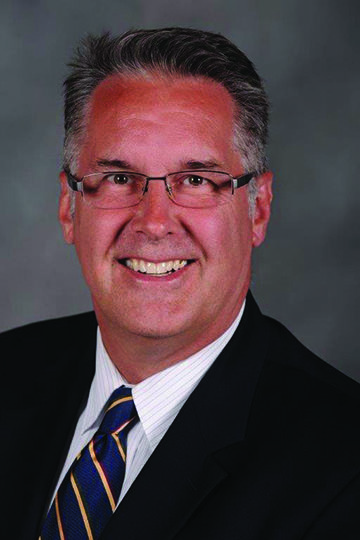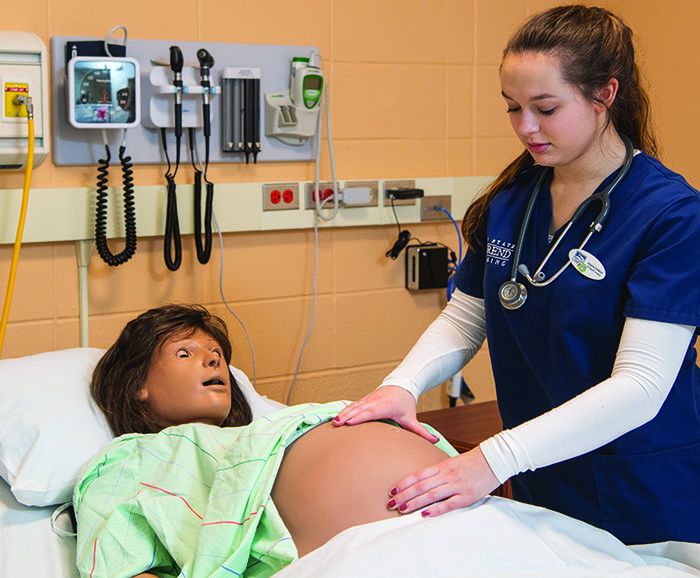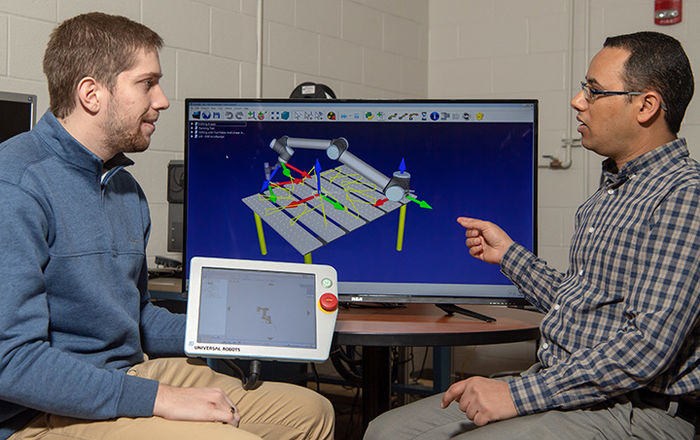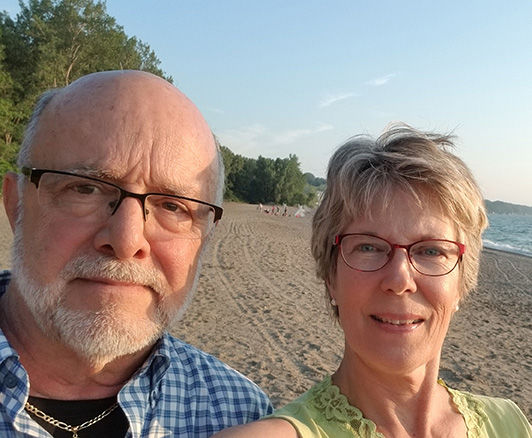Giving Articles
Select a title to jump to that particular story on this page.
- Investing in a growth opportunity
- Every gift makes a difference
- Open Doors Program Generates $7 Million in New Scholarship Funding
- Open Doors
- Let Us Be Your Memory Keeper
- Impact the world
- Hirtzel Foundation Supports Nursing Facilities Enhancements
- Software Gifts Advance Student Learning
- Create transformative experiences
- Schlaudecker Scholarship Helps Adult Learners
- Rees Foundation Gifts Provide Support Two Ways
Investing in a growth opportunity
Success breeds success. Penn State Behrend continues to advance in nearly every measureable way—in enrollment, academics, research, and outreach—and in our fundraising efforts as well.
We have a fundraising goal of $52 million in the current University campaign known as A Greater Penn State for 21st Century Excellence, which runs through June 30, 2021. We’re at the halfway point in the campaign, and at $30 million, we’re more than halfway toward our goal. That’s thanks to the efforts of campaign chair Greg Yahn ’85, ’99 MBA; his all-volunteer committee, and a great many others.
While the need for scholarship funding is ever-present, philanthropic support in this area has been outstanding in recent years. Given the success in that area, we’re now turning our attention to building greater support for faculty research, program support, and capital projects—areas of focus that will grow the margin of excellence for the college.
Faculty research and program support from business and industry, government and foundations, and alumni and friends is critical to our success. It enables us to attract and retain faculty who are inspiring in their teaching and innovative in their research. It provides the resources to give our students outstanding learning experiences. It distinguishes Penn State Behrend as a destination for educational excellence.
Support for capital projects will enable us to meet the needs of our growing college as identified in our 2016 Campus Master Plan. We’re envisioning a new fitness and recreation center, a new learning space known as Knowledge Commons, additional computer laboratories, and the renovation of the former plastics lab in the Fasenmyer Building to create more classroom and faculty office space. All of these projects represent naming opportunities for donors to the college whose philanthropic goals might be furthered by such support.
Through the years, beginning with Mary Behrend’s gift of Glenhill Farm that established the college, philanthropy has fueled our growth and success. With your support, we can achieve even more. If you’d like to talk about the impact you can make by investing in Penn State Behrend, please call us at 814-898-6159 or visit Development and Alumni Relations online.
Kevin E. Moore ’85, ’89
MPA Director, Development and Alumni Relations
Every gift makes a difference
In the stories that follow, we profile the gifts of a number of alumni and friends of the college who are making an impact on the lives of our students. These donors are not alone in their ability to put the power of philanthropy to work for the benefit of Behrend students. Your gift— no matter the amount—can help.
With more than 36,000 alumni and attendees of Penn State Behrend, individual gifts of as little as $50 per year can have a huge collective impact. Please consider adding Penn State Behrend to the organizations you support. You can contribute by electronic funds transfer, credit card, payroll deduction, or a cash gift to support the area of the college that means the most to you. To learn more, visit behrend.psu.edu/giving.
Open Doors Program Generates $7 Million in New Scholarship Funding
Penn State has a long history of opening its doors to students facing financial, academic, or personal challenges to success. It’s why the University created the Open Doors Scholarship program, a special limited-time opportunity that enabled donors to triple the impact of their support for students. Open Doors Scholarships are aimed at helping students at the highest level of financial need, defined as those whose families can cover no more than 25 percent of their educational costs.
In 2018, Penn State Behrend donors committed more than $2.3 million to establish eighteen new Open Doors scholarships that will benefit Behrend students. With a 2:1 match by the University, which was offered through June 2018, the total impact is nearly $7 million in new scholarship dollars. Once fully funded through multi-year payments by the donors, these new scholarships can be expected to provide an estimated $310,000 in additional financial aid to Behrend students annually.
Meet some of the people behind the new Open Doors Scholarships.
Paul Hoffman Scholarship
Paul Hoffman is the first student in the history of Penn State Behrend to establish a scholarship. A junior Accounting major, he is not only a full-time Behrend student but also an entrepreneur.
At the age 12, Hoffman started his own lawn-care service, going door to door to drum up business. That venture has evolved in the years since. With his sister, Christine Hoffman, he now runs Hoffman United, which owns 165 rental units in Erie and employs seventeen people.
The business encompasses construction, property management, and real estate development and has a declared goal of improving blighted areas of the city and enhancing and transforming neighborhoods.
“My focus is on improving the Erie community,” Hoffman said. “Part of that is giving back when I can.”
Hoffman created an Open Doors Scholarship that gives first preference to students who attend a program known as PaSSS, or Pathway to Success: Summer Start. The program, launched at Behrend in 2017, helps entering students make the transition to the college starting in the summer before their first year, learning skills, establishing connections, and earning credits that will help them graduate on time. Those who successfully complete the first session can return for a second summer.
“I thought this scholarship was the perfect way to support hardworking people who want to pursue a college degree but might not be able to afford it,” Hoffman said.
He gave $50,000 to establish the scholarship, and in a show of support for their son’s philanthropy, his parents, Tom and Paula Hoffman, matched his gift at an equal amount. The University’s 2:1 match for Open Doors Scholarships then took the full amount of the scholarship to $300,000.
“My wife and I both graduated from Penn State, and we view the chance to get a Penn State education as extremely valuable,” said Tom Hoffman, an attorney with Knox Law in Erie and also a member of the board of directors of Penn State Behrend’s Council of Fellows and chair of Penn State’s Planned Giving Advisory Council.
The couple jumped at the chance to support their son in such a meaningful way.
“The money he’s using to establish this scholarship is money he’s earned through his own business,” Tom Hoffman said. “You could definitely call us proud parents.”
William and Wendy Korb Scholarship
William Korb ’62 and his wife, Wendy ’63, are longtime supporters of students at both Penn State Behrend and University Park.
Most recently, the couple established five Open Doors scholarships: three for engineering students at University Park, one for Behrend students participating in the PaSSS program, and a second for Behrend students in the Complete Penn State program.
With an initial combined gift of just over $100,000 leveraged by a 2:1 match by the University, the two William and Wendy Korb Open Doors Scholarships at Penn State Behrend total just over $300,000.
“It’s all about education,” William Korb said. “We’ve reaped the benefits of a Penn State degree, and this is our way of giving back.”
An Erie native, William Korb attended Penn State Behrend for two years before graduating from University Park with a degree in Industrial Engineering. The couple’s son, David, earned a degree in Management Information Systems at Behrend in 1987.
In 2006, the Korbs established the Korb Family Trustee Scholarship in Engineering at Behrend, and in 2014 created the college’s first early career professorship with a $1 million gift. The William and Wendy Korb Early Career Professorship in Industrial Engineering is designed to support talented faculty in the discipline of industrial engineering at the start of their academic careers.
Korb is the retired president and CEO of Gilbarco, the world’s leading supplier of fuel dispensers, credit card readers, and point-of-sale devices for gasoline stations.
Myron and Marlene Jones Scholarship
Myron Jones was a pioneer in Erie’s radio and television broadcasting industry. He was also a longtime friend and supporter of Penn State Behrend and of the college’s radio station, WPSE 1450 AM/107.1 FM.
Nearly thirty years ago, Jones helped Penn State Behrend secure the original license for WPSE. In 2014, he and his wife, Marlene, created the Myron Jones Fund for Broadcasting to support the station in perpetuity. Through the years, the Joneses also contributed to student scholarships and youth programs at Penn State Behrend. Since 2011, the Myron Jones Broadcasting Award has been given annually to a Behrend student who is involved in the broadcasting field and who demonstrates leadership, volunteerism, and entrepreneurship.
Myron died this past year at 92. Following his death, Marlene continued the couple’s legacy of philanthropy to Penn State Behrend by establishing an Open Doors Scholarship. Her $150,000 gift combined with a 2:1 match by Penn State resulted in a $450,000 scholarship, which will give first preference to students who participate in the PaSSS program.
Benjamin A. and Carolyn A. Lane Scholarship
Ben Lane’s heart was always with Penn State Behrend. He and his family lived in a yellow house on Jordan Road for decades, and over the years the campus grew up around them. Ben died in 2011, but his wife, Carolyn, continues to live in the same house.
“This college has always been part of our lives. You can’t separate the Lanes from Behrend,” said Kate Delfino ’86, one of the couple’s two daughters. “My parents believed in the school and its mission, and we wanted them to continue to be part of it going forward.”
To honor their parents and their connection and commitment to the college, Kate and her sister, Ann Umbach ’77 ’80g, along with their families — Kate’s husband, Joseph ’92g; her sons, Joseph and Nicholas, and Ann’s husband, David ’83g — have established the Benjamin A. and Carolyn A. Lane Open Doors Scholarship with first preference for students in the Complete Penn State program. That program provides support to students who are at risk of not graduating due to unexpected hardship.
The philosophy of the Open Doors Scholarship would have touched her father deeply, Delfino said. Ben Lane attended Penn State on the G.I. Bill before joining the Behrend faculty in 1954 to teach English and German, then going on to serve as dean of students and director of admissions at the college.
He retired in 1985 as a professor of English emeritus. In 1986, the college established the Benjamin A. Lane Outstanding Service Award and, in 2012, named an outdoor seating area at the south entrance to the Reed Union Building as Ben Lane Plaza.
“My parents both really believed in the power of education to transform lives. My dad was dedicated to the students above all else,” Delfino said. “He believed in them and was an advocate for them, and that is what really drove him. We felt that this particular scholarship was appropriate because we saw my dad go above and beyond to help students who needed it countless times. I have no doubt he’d be thrilled to have this legacy.”
Open Doors
Penn State was founded on the notion that everyone with a desire for higher education should have the opportunity to pursue it. Private support can not only bring talented students from every background to Penn State. It also can help them graduate on time and on track to successful careers and lives. The goal is to ensure that every student, regardless of heritage or financial well-being, has access to a timely degree and true Penn State experience.
Let Us Be Your Memory Keeper
As the Behrend Archives celebrates its tenth anniversary, we are hoping to add to our collection of college history. We are particularly interested in items, such as pennants and other memorabilia, bearing the college’s various campus names, especially Behrend Center. Scanned or original photos are welcome, and if you live in the Erie area we’d be happy to scan them for you. Also, the Behrend Archives has an ongoing oral history program and we are always interested in hearing your stories about your days at Behrend.
For more information about the archives, to share a story or schedule an oral history interview, contact Jane Ingold, reference and instruction librarian and archivist, at 814-898-7278 or [email protected].
Impact the world
The visionary gifts of alumni and friends empower Penn State to tackle some of the world’s most pressing problems. Public universities are distinguished by a dedication to serving the needs of society. The University proposes to become the leader in food, water, and energy security; to address fundamental challenges associated with human health and well-being; and to be a driver for economic development, job creation, and student career success.
Hirtzel Foundation Supports Nursing Facilities Enhancements
The need for registered nurses is expected to grow 15 percent nationwide through 2026, according to the U.S. Bureau of Labor Statistics.
Kimberly Streiff, instructor of nursing at Penn State Behrend, is seeing that job demand firsthand: All of Behrend’s May 2018 nursing students had jobs waiting for them when they completed their degrees.
“You look at the national job market, and you’ll see there’s a definitive need for more nurses,” Streiff said.
To help meet that need, Behrend has expanded its nursing labs significantly with the help of a $900,000 gift from the Orris C. and Beatrice Dewey Hirtzel Memorial Foundation of North East, Pennsylvania. With the expansion, students will now be learning in an expanded Simulation (SIM) Center with three SIM bays—up from two previously—each with its own control room.
The SIM Center features high-fidelity mannequins that are programmed to simulate real-life situations involving patients in a multitude of scenarios, from cardiac arrest to epileptic seizures. One of the labs is designed for intensive care and medical-surgical simulations; a second is customized for obstetrical/neonatal simulations, and the third lab can be adapted as needed for medical-surgical, pediatric, or psychiatric simulations. In addition to providing students with hands-on experience addressing true-to-life health conditions, the simulations can be broadcast live to other students observing, Streiff said.
“You can’t always predict the type of patient you’re going to see,” Streiff said. “These labs allow us to create and simulate different scenarios, which give students a chance to practice in a realistic learning process environment.“
In addition to the expansion of the SIM Center, which was relocated to a larger space, the project doubled the size of the program’s nursing skills lab, which features nine beds, equipment, and supplies arranged in a hospital-like setting. Penn State Behrend's nursing program is now able to enroll as many as eighty nursing students, up from fifty. In addition, the improvements and expansion better position the program to work with community partners and move into new areas of academic study.
“These new expanded facilities and high-tech equipment not only allow us to grow our nursing program now, but also prepare Behrend to be a regional leader in nursing into the future," Streiff said.
The Hirtzel Foundation was established by Philip D. Hirtzel in memory of his parents. Hirtzel had a strong interest in enabling local students to obtain a college education and in encouraging the availability of high-quality health care in the region. The expansion of the college’s nursing facilities advances these objectives.
Since 1995, the foundation has made gifts to Penn State Behrend totaling more than $1.1 million for equipment purchases and facilities projects; these include a $176,000 gift to fit the School of Science’s confocal microscope with an ultraviolet laser and camera for better analysis of tissue samples and a $381,000 gift for the purchase of an inductively coupled plasma mass spectrometer (ICP-MS) used to detect trace amounts of toxic elements in environmental and biological samples.
Software Gifts Advance Student Learning
In-kind gifts of software from global IT solutions provider Siemens will give engineering and business students at Penn State Behrend access to three industry-leading design and manufacturing management platforms. Two additional gifts of software from RoboDK Inc. and Riskalyze Inc. will likewise benefit Behrend students.
Siemens Tecnomatix suite of software
The Siemens donations, valued at $10.8 million, provide access to NX high-end CAD/CAM/CAE software for design, simulation, and manufacturing; Teamcenter, the world’s most widely used product lifecycle management system; and Fibersim for design, analysis, and manufacture of composite materials and parts.
“These gifts support both teaching and research at Penn State Behrend,” said Dr. Faisal Aqlan, assistant professor of industrial engineering, “and will give our students excellent tools for building the skills they need to succeed in their work.”
RoboDK simulator platform
RoboDK’s in-kind donation of software, valued at $90,000, will give engineering students the opportunity to use simulation software for robotics applications.
“The software will be used to teach our students how to program robots offline and work on manufacturing projects that involve automated processes,” Aqlan said.
The RoboDK platform will also be used in research initiatives with local industry as well as undergraduate senior design projects.
Riskalyze risk analysis software
With the donation from Riskalyze, valued at more than $83,000, students in the Black School of Business now have access to that company’s investment risk-assessment software for use in stock trading simulations and in management of the school’s Intrieri Family Student Managed Fund.
In FIN 420 Investment and Portfolio Analysis, Eric Robbins, lecturer in finance, employs the software to introduce students to the world of investment by exploring different types of investments, comparing them in terms of risk and other dimensions, and learning how to combine different assets to form a portfolio.
“When it comes to financial education, I think it’s extremely important to bring in tools that students are going to use when they enter the workforce,” Robbins said. “Riskalyze software exposes students to the technology that professionals are using every day and allows them to experience real-life investment decision scenarios.”
Create transformative experiences
Philanthropy can provide the opportunities—on campus and out in the world—that let students discover their full potential and make a difference. Penn State is at the forefront of teaching excellence in the classroom and online, but delivery of content is only the beginning. Transformative experiences that go beyond traditional modes of learning help students build global perspectives, digital capabilities, an appreciation for the arts and humanities, and so much more.
Schlaudecker Scholarship Helps Adult Learners
In the early 1960s, James Schlaudecker was a young husband and father of two working as a garage mechanic for $1 an hour. It certainly wasn’t enough to support his family.
So, in 1963, Schlaudecker decided to use the money his late father had left him to do something his dad had urged him to do before passing—enroll in college.
It took five years to complete his associate degree at Penn State Behrend—juggling employment, family responsibilities, spotty transportation, and financial challenges—but he did it.
“It was a struggle, but one that was extremely important for me to achieve,” he said.
Now, Schlaudecker ’68 is helping students in similar situations. He and his wife, Sandra, have created a First-Time Endowed Donor Matching scholarship designated for adult learners enrolled in Penn State Behrend’s mechanical engineering technology and electrical engineering technology programs. The Schlaudeckers’ gift of $50,000 was matched by the University, bringing the total scholarship amount to $100,000.
“I was an unenthusiastic student in high school, with the grades to match,” Schlaudecker said, “but at Behrend, I entered an exciting environment of learning and discovery. It was one of the most fulfilling, although most challenging, periods in my life. I was hungry to learn and succeed. Remembering this, I decided to create a scholarship for others who might be experiencing the same challenges I had faced.”
After his graduation from Behrend, Schlaudecker launched a career with Procter & Gamble that ultimately took the couple and their son all over the world. He has now retired and settled in Blacksburg, Virginia.
“Penn State Behrend represents a crucial chapter in my life,” he said, “and Sandy understands the warm spot in my heart for the college, which is why she also supports this donation enthusiastically. I hope this scholarship helps others who have dreams of going to college but are facing financial challenges that might otherwise keep them from getting that degree."
Rees Foundation Gifts Provide Support Two Ways
A recent gift from the John Nesbit Rees and Sarah Henne Rees Charitable Foundation of Titusville, Pennsylvania, is supporting one of Penn State Behrend’s premier cultural enrichment programs, while a second gift will benefit Behrend students in the form of scholarships.
The Rees Foundation, established following the deaths of its benefactors in 1988, serves the needs of residents of Crawford, Forest, Venango, and Warren counties. The foundation has supported Behrend since 1990 with funding to establish and support scholarships and programs that help residents of these four counties.
One of two recent gifts is a twoyear commitment totaling $50,000 for Penn State Behrend’s Music at Noon: The Logan Series. The series offers informal lunchtime performances by professional chamber music ensembles and includes an educational component for area schoolchildren. As part of the agreement, the Logan Series staff will develop a public concert performance and outreach program in Titusville.
Through a second gift, the foundation is providing scholarship assistance to Behrend students from the four counties it serves with preference given to those who live in the Titusville area. The grant of $20,000 a year for each of five years is intended to provide scholarships that help students who might not otherwise be able to attend college get a Penn State Behrend education.



